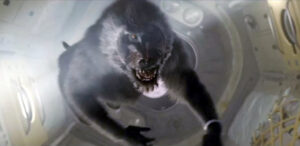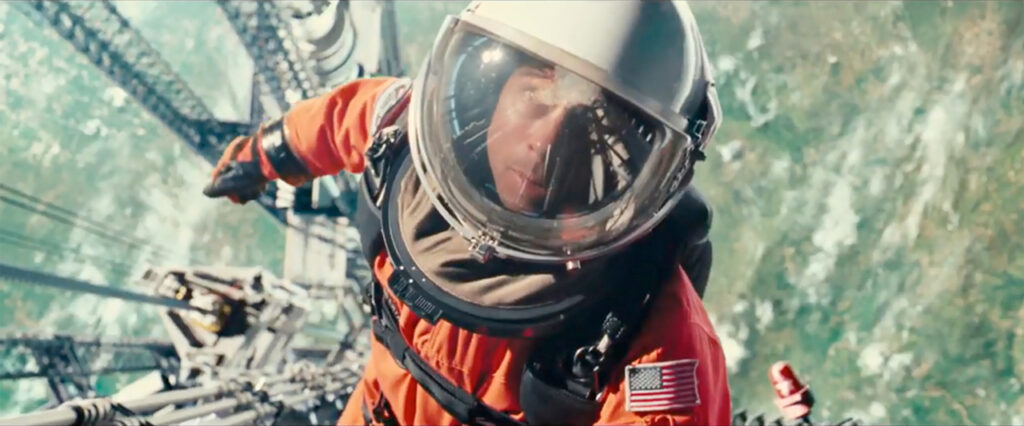Dark Portrayals of White Male Angst
(An essay by John Burke, Sept 30, 2019)
***
Months ago I bought into the media blitz for the newest science fiction blockbuster starring Brad Pitt called Ad Astra (wr. Ethan Gross and James Gray/dir. James Gray). Not since the 2016 release of Arrival (wr. Eric Heisserer/dir. Denis Villeneuve) had I anticipated a film as much as this one. Finally, a science fiction adventure movie that didn’t involve brain-dead, muscle-bound ‘heroes’ with physics-defying superpowers saving all the infinite universes. (Saving the world is no longer enough anymore, apparently.) The story revolves around Roy McBride (played with infinite stoicism by Brad Pitt), an exceptionally competent astronaut/engineer working on an ersatz Tower of Babel connecting the surface of the Earth to space. After surviving what can only be described as the most terrifying workplace accident ever, Roy is recruited by the American military to travel out to the edges of the solar system to find his long-lost father, H. Clifford McBride. The elder McBride (in an adequate, clench-jawed performance by Tommy Lee Jones) is an astronaut hero of a different kind, thought lost during a failed mission to the outer solar system in search of extraterrestrial life in the galaxy.
To me, nothing in recent memory sounded more like a winner. There were so many questions that needed answers: Would Roy McBride be willing to accept the mission despite dredging up memories of his long missing father? Would he survive his arduous 2nd-Act trip to Neptune? Could his father still be alive after more than 16 years alone in space? All this would be in the service the big questions: Why had his father’s mission failed? And what implications would this hold for Earth and the billions of humans breathlessly waiting for the answer. And could Roy turn his father’s doomed mission into a success? Unfortunately, most of those questions never got satisfactory answers.
To me, nothing in recent memory sounded more like a winner.
The director James Gray is quoted on Wikipedia as wanting; “the most realistic depiction of space travel that’s been put in a movie and to basically say (that) space is awfully hostile to us”. Gray also superficially referenced Joseph Conrad’s ‘Heart of Darkness’, a bit tone deaf since his story lacked the core of Conrad’s epic, which was the exploitation of indigenous populations by colonialism. (1) Gray’s hyperbole aside, it was at least heartening to hear a filmmaker strive for something ambitious, though I certainly don’t believe he came even close to either of those goals.
In reference to the ‘realistic’ dangers of space travel, I presume  an astronaut travelling to Neptune would have a lot more immediate concerns than mutant space baboons. I winced more than a few times when it came to the scientific probability of some of the set pieces in this movie, some of which displayed grade-school level understanding of how things actually work in space.(2) My biggest complaint in this area has to be the preposterous idea that a human built space-craft orbiting at the distance of Neptune (4.5 billion kilometres away) could produce enough energy to imperil the Earth, while the sun (a 1.4 million kilometre wide fusion reactor only 150 million kilometres away) doesn’t cause much of a problem. Am I to understand that the ‘anti-matter’ battery that the ship uses was never tested before they left? If so, wouldn’t that imperil the Earth a lot more than the actual Lima Project?
an astronaut travelling to Neptune would have a lot more immediate concerns than mutant space baboons. I winced more than a few times when it came to the scientific probability of some of the set pieces in this movie, some of which displayed grade-school level understanding of how things actually work in space.(2) My biggest complaint in this area has to be the preposterous idea that a human built space-craft orbiting at the distance of Neptune (4.5 billion kilometres away) could produce enough energy to imperil the Earth, while the sun (a 1.4 million kilometre wide fusion reactor only 150 million kilometres away) doesn’t cause much of a problem. Am I to understand that the ‘anti-matter’ battery that the ship uses was never tested before they left? If so, wouldn’t that imperil the Earth a lot more than the actual Lima Project?
Ad Astra suffers from the same problem arising in most recent action/adventure movies: the antagonist’s motives are usually as thin as the paper they’re badly written on …
I’ll admit I’m mystified as to why this was important for the story. I understand the Hollywood trope that the stakes have to be raised to infinity, but what does this unnecessary story point have to do with the peril of the main character? Nothing. Even in a flawed movie like The Martian (wr. Drew Goddard/dir. Ridley Scott) , writer Drew Goddard resisted inserting an outlandish plot point where the rescue of Mark Watney from Mars somehow saved the entire planet Earth, and the movie was better for it. It would have been a lot simpler if the evidence that H. Clifford McBride (like Mark Watney) was still alive was more subtle. Isn’t the rescue of a space hero enough incentive to send out a mission?

As an action-adventure movie, Ad Astra suffers from the same problem arising in most recent action/adventure movies: the antagonist’s motives are usually as thin as the paper they’re badly written on, more justified by the visual effects budget than the motivation of the characters. The sheer number of big-budget movies that fall apart in the third act are legion, especially with sequels whose ending is actually the beginning of the next installment, where the climactic battle at the end hardly seems worth the energy put into its depiction. The bad guys want to destroy the world and the good guys want to save it. Nothing is resolved, nor is any meaning implied. Reset the ‘time-line’ and start again. And Ad Astra offers even a thinner motivation for all the death and destruction resulting from the Lima Project: That H. Clifford McBride has somehow found ‘proof’ that extraterrestrial life doesn’t exist. I’m not exactly sure how someone would go about proving such a thing. Are the filmmakers suggesting McBride scanned every planet in every star system in every galaxy in the known universe? And why was it necessary to travel to Neptune to do this? The senior McBride’s despair is supposed to be the result of proving this negative, but anyone can tell you that such a thing isn’t logically provable.
But Ad Astra isn’t just an action-adventure movie. The director tried to make a character study disguised as an action movie, a dishonest approach that obviously failed to bring in a Marvel-level audience despite the star appeal of Brad Pitt.
But Ad Astra isn’t just an action-adventure movie. The director tried to make a character study disguised as an action movie, a dishonest approach that obviously failed to bring in a Marvel-level audience despite the star appeal of Brad Pitt. The thing about creating a detailed character study is that it often gets obscured by a complicated plot. And the plot of Ad Astra is needlessly complicated. What is Roy McBride’s objective here? To save the planet? To intervene in a lunar civil war? Or to help the Martian freedom fighters? Apparently the actual journey to the outer solar system isn’t perilous enough. Unfortunately, this scattergun approach and Pitt’s opaque characterization of McBride prevents any kind of introspection on the nature of the father/son relationship or an understanding of either character’s motivations. I wanted to look deeper into exactly why Roy McBride was selected to help find his father, who abandoned him 16 years before. It would have been interesting to learn exactly what burning question he hoped to answer by agreeing to this. What exactly is he hoping to gain? Did his father abuse him, or just abandon him? Is he trying to redeem his own past failures? Why not take out the space baboons and the war on the moon and delve deeper into that?
All this begs the question why the filmmakers find such a character so fascinating in the first place, enough that they were willing to invest $100 million to make this movie?
Much like the movie First Man (wr. Josh Singer/dir. Damien Chazelle) released last year (at half the budget), Ad Astra is actually a portrait of a closed off, emotionless character that is allegedly exceptional because of this character flaw. (3) The movie fully buys into the idea that this characters’ exceptionalism was a result of these toxic traits. I can’t believe McBride’s constant dour presence would win him too many friends in high places. His supervisors would never have his name first in mind for any prestigious project, making it unlikely he would be promoted, regardless of how competent he was. Why the hell would the military trust the fate of the Earth to such an emotionally erratic character? (4)
***
All this begs the question why the filmmakers find such a character  so fascinating in the first place, enough that they were willing to invest $100 million to make this movie? If the audience is supposed to relate to the character, why set up the impossible task of portraying the inner life of a character whose impenetrable shell makes it impossible to read what he’s thinking? Why would you deliberately burden your film with such an opaque character in the lead? Bladerunner 2049 (wr. Hampton Fancher/dir. Denis Villeneuve) suffered from this exact problem, an artificial trope inserted into the story to somehow make the character more interesting but actually having the opposite effect. Does anybody even want to watch the painfully torturous self-loathing of a white male hero anymore? Hasn’t that story been worn down to the nub? Did it ever occur to anyone that maybe these repressed white males are not that deep? Maybe they’re just boring fucks who don’t have any insight into the human condition? Maybe they have nothing of interest to say. Or maybe they’re just afraid that someone will find out they’re not as competent or interesting as they make themselves out to be.
so fascinating in the first place, enough that they were willing to invest $100 million to make this movie? If the audience is supposed to relate to the character, why set up the impossible task of portraying the inner life of a character whose impenetrable shell makes it impossible to read what he’s thinking? Why would you deliberately burden your film with such an opaque character in the lead? Bladerunner 2049 (wr. Hampton Fancher/dir. Denis Villeneuve) suffered from this exact problem, an artificial trope inserted into the story to somehow make the character more interesting but actually having the opposite effect. Does anybody even want to watch the painfully torturous self-loathing of a white male hero anymore? Hasn’t that story been worn down to the nub? Did it ever occur to anyone that maybe these repressed white males are not that deep? Maybe they’re just boring fucks who don’t have any insight into the human condition? Maybe they have nothing of interest to say. Or maybe they’re just afraid that someone will find out they’re not as competent or interesting as they make themselves out to be.
Over the years, filmmakers have introduced us to these unpalatable characters, assuming these unrepentant toxic male characters are interesting enough to feature in their movies. The Searchers (wr. Frank S. Nugent/dir. John Ford), Taxi Driver (wr. Paul Shrader/dir. Martin Scorcese), Rambo: First Blood 2 (wr. Kevin Jarre and Sylvester Stallone/dir. George P. Cosmatos), Wolverine (wr. Mark Bomback and Scott Frank/dir. James Mangold), John Wick (wr. Derek Kolstad/dir. Chad Stahelski), The Joker (wr. Scott Silver and Todd Phillips/dir. Todd Phillips), just to name a few. All in the name of releasing these psychopaths in a flurry of violence in the name of their own version of justice.
***
The attempt to shoehorn these characters into the ‘hero’ template is a disservice heaped upon movies by Joseph Campbell’s simplistic theories on the nature of mythology. A figure plucked from obscurity to fulfill his destiny of saving the world. How could these characters ever be considered a mythical hero? Ad Astra appears to be another situation where the writers tried to shoe-horn Joseph Campbell’s mythological formats onto a story that just didn’t require them. Maybe I’m pointing out the obvious here, but Ad Astra isn’t a coming of age story. It’s an inward journey of self-reflection by a mature individual, someone who is forced to contemplate his own failings and the failings of the man he idolized. Essentially, to reflect on why Roy McBride didn’t succeed in becoming a hero like his father.
Maybe I’m pointing out the obvious here, but Ad Astra isn’t a coming of age story. It’s an inward journey of self-reflection by a mature individual, someone who is forced to contemplate his own failings and the failings of the man he idolized.
The ego of actors plays directly into the debunked theories of Joseph Campbell and the hero myth. I can only assume Brad Pitt is not immune to such things. But when playing an actual mythical hero, like Achilles in Troy (wr. David Benioff/dir. Wolfgang Peterson), Pitt falls victim to looking like a stereotype rather than a character. To diffuse the heroics of the film among the cast would result in diminishing the lead role, something unimaginable to a ‘movie star’. But Brad Pitt is not your typical movie star. He excels in playing against his looks, often portraying the character’s despair at being forced into a role he is not quite comfortable with. His work in other character studies is excellent, in movies like The Assassination of Jesse James by the Coward Robert Ford (wr./dir. Andrew Dominik) and Moneyball (wr. Steven Zaillian and Aaron Sorkin /dir. Bennett Miller). He seems to do his best work in ensemble roles like in 12 Monkeys (wr. David Web Peoples and Janet Peoples/dir. Terry Gilliam), Se7en (wr.Andrew Kevin Walker/dir. David Fincher), Interview with a Vampire (wr. Anne Rice/dir. Neil Jordan), Babel (wr./dir) and Fight Club (wr. Jim Uhls/dir. David Fincher).
***

What would have redeemed the entire movie for me would have been to use another, slightly less worn trope: It was all a dream. When done well, it can work wonders, as in Life of Pi (wr. David Magee/dir. Ang Lee). In the opening sequence, McBride comes so close to the stars (the literal meaning of the Latin title) almost within reach before the Tower of Babel that was the radio tower collapses and he falls back to earth like Icarus after he got too close to the sun. This could have been easily achieved by making the whole movie one extended fantasy sequence playing out in the mind of the younger McBride, the underachieving astronaut/engineer who literally falls far short of his overtly heroic father.

What if he was just an ordinary guy who did his best, but couldn’t quite get to the stars? This kind of tragic hero is far more compelling than any emotionally retarded ‘heroic’ figure. It would have at least made McBride relatable, which is kind of what a character study is about, really. Even if the hero is tragic, the audience needs to be allowed recognize his humanity. It could have made the entire exercise a comment on this toxic male stereotype. A comment on how in the minds of far too many white males the world would be a utopia if only everyone would do what they say. Threading such mythology through the story would have saved it from its lack of direction and all the expository dialogue in the final act, something that dragged down the pace of the finale. The symbolism of ‘finally letting his father go’ was enough to justify his trip to Neptune, at least in Roy’s mind, as would heroically recovering his father’s data being his redemption. All of this would be rendered symbolic when his true status of impotence in the face of death is revealed. If Roy McBride had fallen to his death from the tower of Babel at the end of the movie, it would have allowed me to have at least some empathy for this person who is otherwise repellent. Instead the filmmakers opted for the more obvious trope, where the character remains basically the same, even reconciling with his wife in a sedate ‘happily-ever-after’ ending.
What if he was just an ordinary guy who did his best, but couldn’t quite get to the stars?
All that being said, Ad Astra is very watchable, visually stunning with engaging action set pieces. As an action/adventure movie, it almost succeeds, though it didn’t quite reach its potential either on a mythological or emotional level. As a character study, less so. The movie cost a lot of money to make and promote, a marker that has long-ago ceased to be any kind of indicator of its quality as a movie experience. It made its money back, with a modest profit, but not enough that you would expect another like it again in the near future, much to my dismay. But there is something to be said for an ambitious undertaking, even if it doesn’t completely succeed.
***
1) To my knowledge, there are no indigenous peoples in space to exploit.
2) At one point, Roy crawls up to the top of a rocket on the cryogenic fuel tanks. Even if he could get into the crew cabin using this improbable route, I would have thought the liquid propellant would freeze his fingers off long before he got to the top, given that liquid oxygen freezes at about minus 220 degrees Celsius. Also, when sending a message to Neptune, you would not expect an answer for at least eight hours because of the speed of light. And don’t get me started on the idea of a car-chase/gun battle on the moon at speeds that would have sent the vehicles into orbit.
3) As I have written before, I believe this characterization of Neil Armstrong in First Man is unfair.
4) Reality check: If you’re a bitter, manual labourer with a huge chip on your shoulder (or for that matter, a shell-shocked, gun-toting recluse surviving on wild game in the Alaska wilderness), no one’s coming to pull you from obscurity to save the rest of the world. If the Earth is in peril, trust me, you’re gonna die like the rest of us.
***
Ad Astra (2019) – 124 min.
Released by: 20th Century Fox
Direction by: James Gray
Written by: James Gray and Ethan Gross
Cinematography by: Hoyte van Hoytema
Starring: Brad Pitt, Tommy Lee Jones, Ruth Negga and Donald Sutherland.
***
588 total views, 1 views today

